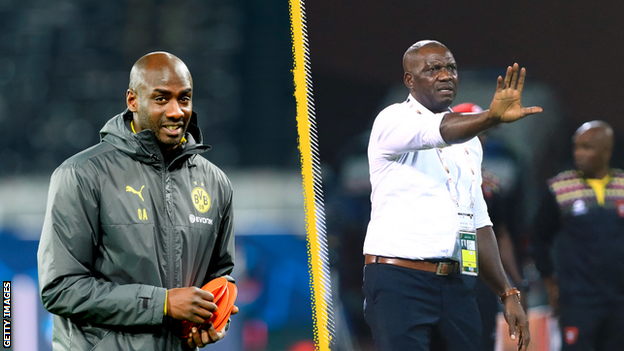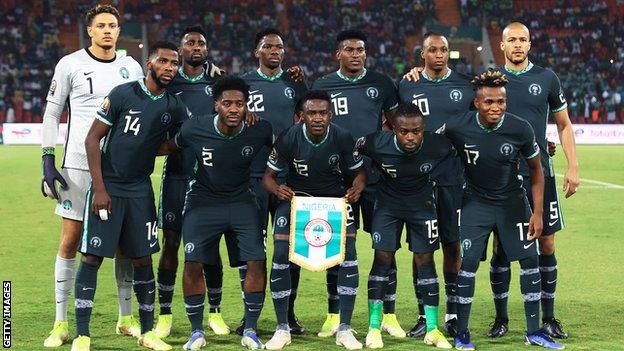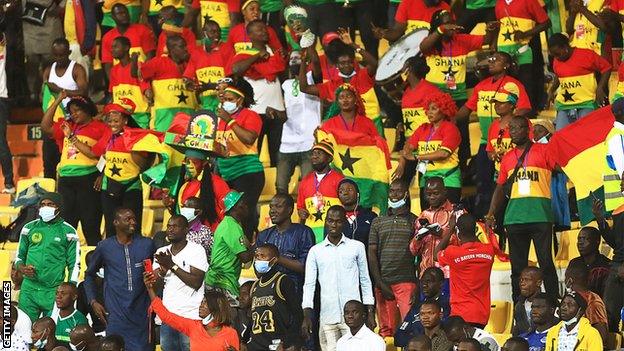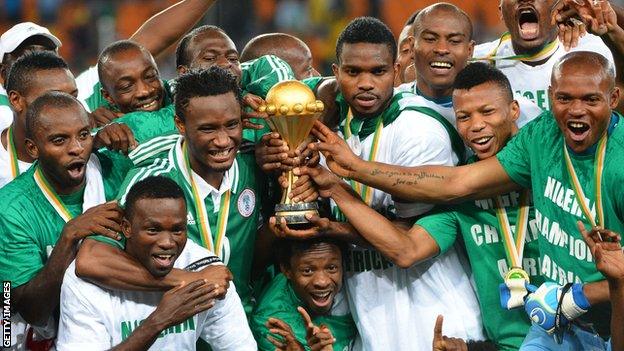World Cup 2022: 'Jollof derby' sees West African rivals battle for Qatar
- Published

Ghana appointed Otto Addo (left) after the Africa Cup of Nations, while Nigeria retained Augustine Eguavoen.
Mention Nigeria v Ghana and two things spring to mind for many - a rivalry that centres on football and jollof rice.
While the debate over which nation makes the best version of the red, spicy rice dish may never be resolved, the argument over football will be decided, at least for the time-being, on the pitch on 25 and 29 March.
The two nations will meet in Kumasi on 25 March with a place at the World Cup at stake - a fitting event to mark the 50th instalment of West Africa's fiercest footballing rivalry.
It's their first meeting in 11 years and their first in a World Cup qualifier since 2001.
Four days later, Nigeria host the Black Stars in Abuja with the victors qualifying for Qatar 2022.
The Super Eagles are bidding to reach a fourth consecutive World Cup, and seventh in total, while Ghana - three-time qualifiers - are looking to return to the tournament after failing to reach the 2018 finals in Russia.
Big brother, little success
There are very few matches that have the cultural and emotional impact that defines a Nigeria-Ghana clash.
The two nations stood side-by-side on the frontlines in the battle for independence from colonial rule in the 1950s, while Ghana had a large migrant community in Nigeria up until the 1980s.

Nigeria lost 1-0 to Tunisia in the last of the 2021 Africa Cup of Nations in Cameroon.
As far as size and population go, Nigeria - with Africa's largest population of over 200 million - is clearly the bigger of the two.
However, in terms of football, Ghana has the edge: 4-3 in Africa Cup of Nations trophies, a World Cup quarter-final appearance (albeit in fewer tournaments) and a 21-10 advantage in head-to-head meetings.
Most of those victories came in the period of Ghana's continental dominance in the 70s and 80s, but the tide has turned decisively since 1992 when the Black Stars inflicted a come-from-behind 2-1 win over the Super Eagles in the Nations Cup semi-final.
Nigeria have since gone on to claim continental success in 1994 and 2013, to add to their 1980 title while Ghana - four-time African champions - have not won the trophy since 1982, instead gaining a reputation for coming up just short all too often over the last four decades.
Mind games
Ahead of the crunch play-off, Ghana delayed the public announcement of their squad until as late as possible, in a "strategy" designed to muddle the Nigerian camp's preparations.
"And they are very confused," Ghana FA (GFA) executive council member Sammy Anim Addo claimed to BBC Sport Africa prior to the squad's announcement earlier this week.
"We can't always do the same thing all the time and for the first time this is the strategy and we believe in it. We will beat Nigeria and qualify to Qatar 2022."
Under a new technical team with Otto Addo as coach and former Tottenham player Chris Hughton as technical director, Ghana will be without suspended captain Andre Ayew as they file out in front of the highly-demanding Kumasi crowd.
Nigeria are also missing players, with Alex Iwobi suspended, influential Leicester City midfielder Wilfred Ndidi injured while another Leicester player, Ademola Lookman, is available after changing allegiances from England.

Ghana were forced to move to the Baba Yara stadium in Kumasi after the playing surface at the venue in Cape Coast was damaged during the country's Independence Day celebrations on 6 March
Super Eagles fans have, however, gone from enthusiastic optimism to mild pessimism about the fixture since the draw took place in late January.
On the day, the sense was that Ghana represented one of the more favourable match-ups because the four-time African champions had just suffered a humiliating exit at the Africa Cup of Nations.
Ghana finished bottom of Group C - behind tournament debutants Comoros - and lost two of their three matches, including to the island minnows.
In contrast, Nigeria's three wins from three group matches had secured them a place in the round of 16, and also the favourites tag, but the team led by Augustine Eguavoen suffered a shock 1-0 defeat at the hands of Tunisia in the last 16.
"I take responsibility for everything that happened in Cameroon, but things will be different against Ghana," Eguavoen told BBC Sport Africa.
"What we have at stake is a place at the World Cup, and nothing comes bigger than that. I prefer we talk less and take care of business on the pitch."
Long-standing rivalry
The Ghana-Nigeria rivalry has been around for as long as both countries have existed.
Ghana became the first black African nation to gain its independence from colonial rule in 1957 and Nigeria only got theirs in 1960, with Nigerians feeling slighted as they believed their more sizeable nation should have gained its independence before 'tiny' Ghana.
The countries do not share borders and are separated by Togo and Benin but both rivalries and friendships have seemingly developed as a result of both being English-speaking British colonies surrounded by French-speaking neighbours.

Nigeria won their third Africa Cup of Nations title in 2013 with a win over Burkina Faso
The football rivalry started while they both fought for independence, with Ghana winning the first friendly meetings in the 1950s, including an incredible 7-0 thrashing of the Red Devils, as the Nigerian team was then called, in June 1955.
Political tension between the West African cousins started with the Ghanaian government's Aliens Compliance Order of 1969, which ordered all undocumented aliens to leave Ghana.
Although Togolese, Burkinabes, Ivorians, Nigeriens and other West Africans were in the country, Nigerians - mostly ethnic Yorubas - formed the majority of the foreign population in Ghana then.
Some of them had been living in Ghana for years and were into their second and third generations, and Nigerians - whose journeys home were not pleasant - felt as though the exercise was aimed at them.
Things changed when oil came to Nigeria and Ghana's economy collapsed, meaning that from around 1974 the Ghanaian exodus to Nigeria in search of jobs was on.
Almost a decade later, the oil boom excitement slumped with the world petroleum glut and the Nigerian economy suffered a downturn of her own, prompting the government to order over a million West African migrants, most of them Ghanaians, to leave Nigeria at short notice in 1983.
Undocumented West African immigrants were taking jobs from Nigerians and causing high crime rates, the government said.
Events of 1983 often set the tone and tend to dominate pre-match discussions among both sets of fans when the countries clash on the football field, with this week's coming games likely to be little different.